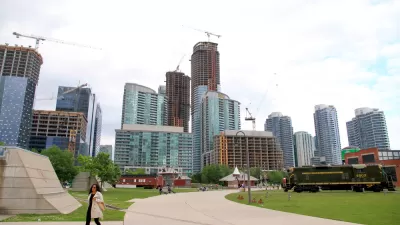The question of how and where to grow is causing controversy in Toronto. A recent op-ed picks a side.

An op-ed by Dave Wilkes, president and CEO of the Building Industry and Land Development Association (BILD), announces support for proposed changes to the controversial Growth Plan under consideration in Toronto.
For Wilkes, the question of whether to support the plan comes down to housing, and the current plan isn't building enough of it.
Much has been written about the proposed changes to the Growth Plan, the policy that manages growth in the Greater Golden Horseshoe. Many commentators have warned that the changes will bring more sprawl. By using that loaded word, they obscure the real issue we should be discussing: How do we build an adequate supply of housing for people in our region in a sustainable way?
Right now, we are not building nearly enough to accommodate the 115,000 people arriving in the GTA every year, and our worsening housing affordability attests to that. With the proposed changes to the Growth Plan, the provincial government is taking action to help increase housing supply while continuing to protect the environment.
According to Wilkes, the areas of the region targeted for growth are too resistant to new development for the plan to be effective. So density isn't being added to the areas with the transportation infrastructure to support it.
Instead, densification is being pushed to outlying areas of municipalities like Brampton, Vaughan and Pickering, on land designated for future development. Often, these areas are not served by transit, so residents have to drive, contributing to the traffic congestion and emissions that the Growth Plan was meant to alleviate.
Wilkes is responding to the position described in a news article by Ben Spurr from January of this year. Ontario Premier Doug Ford ran for office on a campaign platform that included a plan to expand the growth boundary surrounding the region.
FULL STORY: BILD: A lack of housing is the real issue

Maui's Vacation Rental Debate Turns Ugly
Verbal attacks, misinformation campaigns and fistfights plague a high-stakes debate to convert thousands of vacation rentals into long-term housing.

Planetizen Federal Action Tracker
A weekly monitor of how Trump’s orders and actions are impacting planners and planning in America.

San Francisco Suspends Traffic Calming Amidst Record Deaths
Citing “a challenging fiscal landscape,” the city will cease the program on the heels of 42 traffic deaths, including 24 pedestrians.

Adaptive Reuse Will Create Housing in a Suburban Texas Strip Mall
A developer is reimagining a strip mall property as a mixed-use complex with housing and retail.

Study: Anti-Homelessness Laws Don’t Work
Research shows that punitive measures that criminalized unhoused people don’t help reduce homelessness.

In U.S., Urban Gondolas Face Uphill Battle
Cities in Latin America and Europe have embraced aerial transitways — AKA gondolas — as sustainable, convenient urban transport, especially in tricky geographies. American cities have yet to catch up.
Urban Design for Planners 1: Software Tools
This six-course series explores essential urban design concepts using open source software and equips planners with the tools they need to participate fully in the urban design process.
Planning for Universal Design
Learn the tools for implementing Universal Design in planning regulations.
Heyer Gruel & Associates PA
JM Goldson LLC
Custer County Colorado
City of Camden Redevelopment Agency
City of Astoria
Transportation Research & Education Center (TREC) at Portland State University
Jefferson Parish Government
Camden Redevelopment Agency
City of Claremont





























